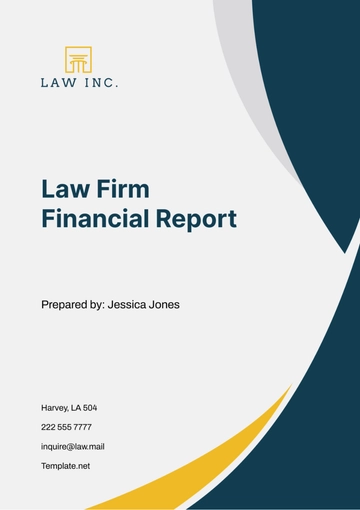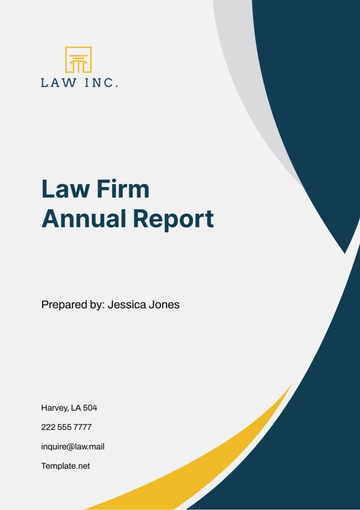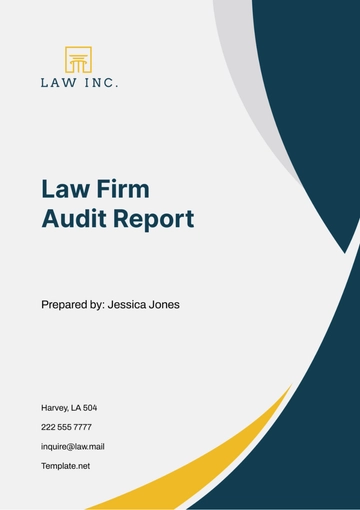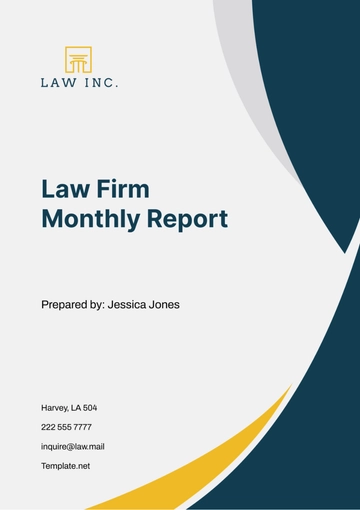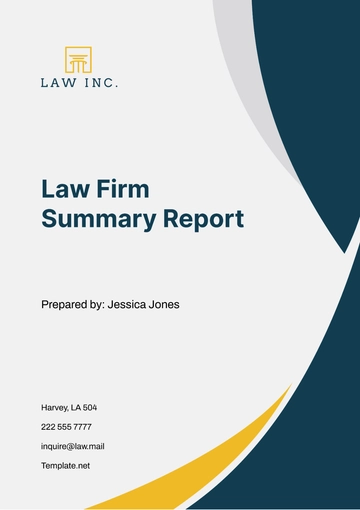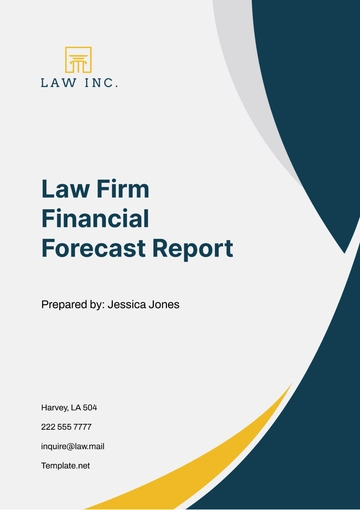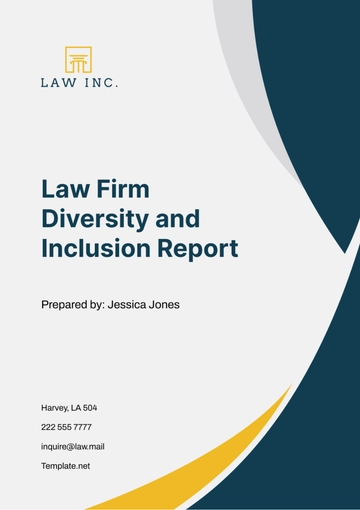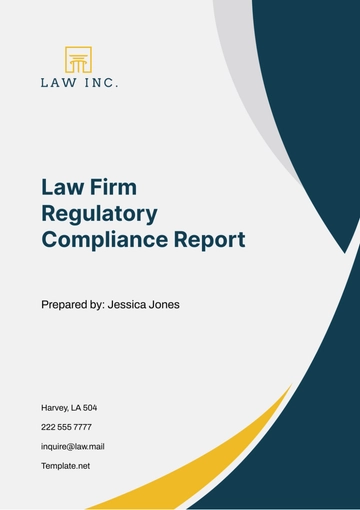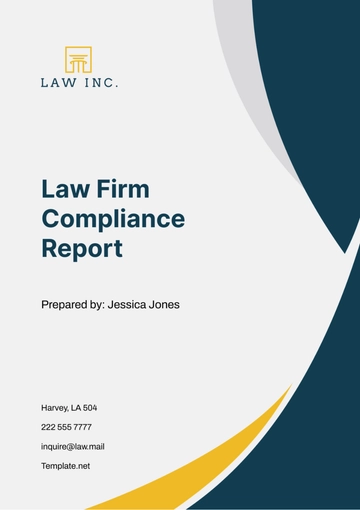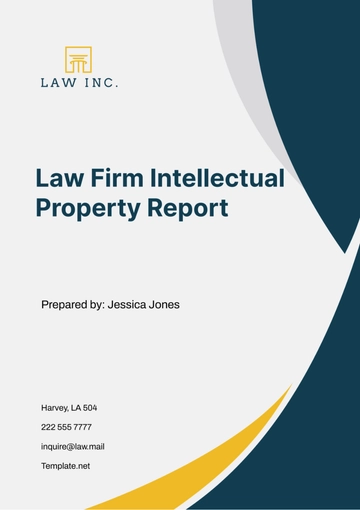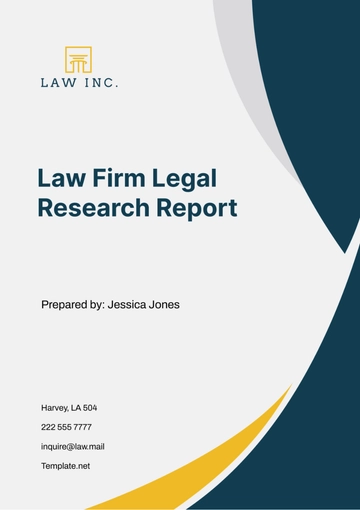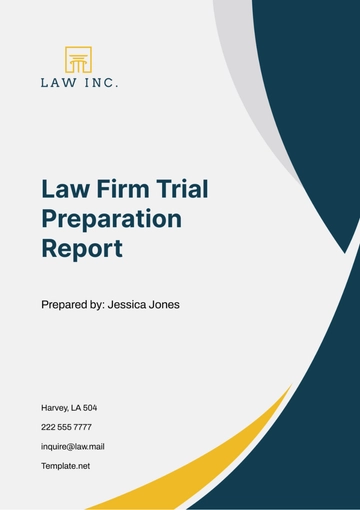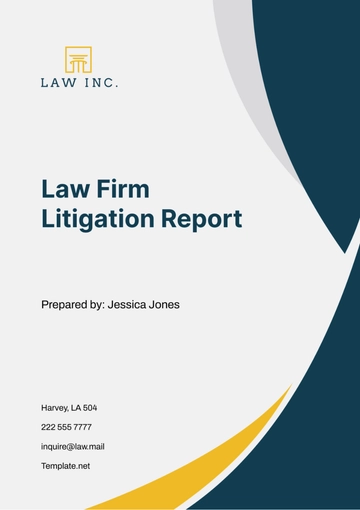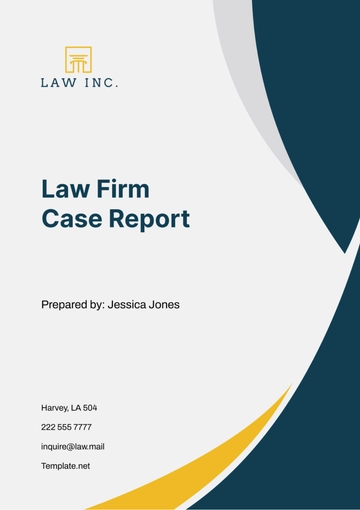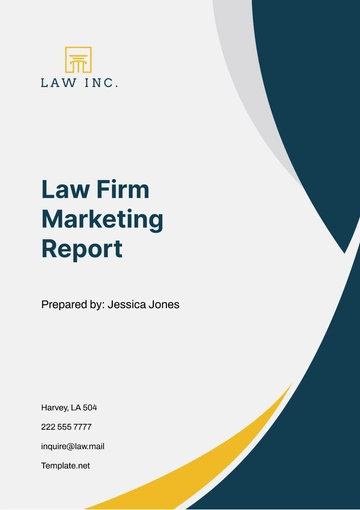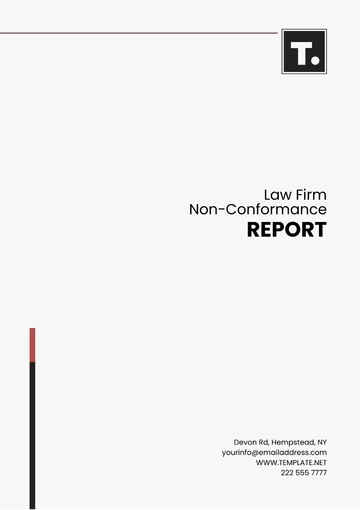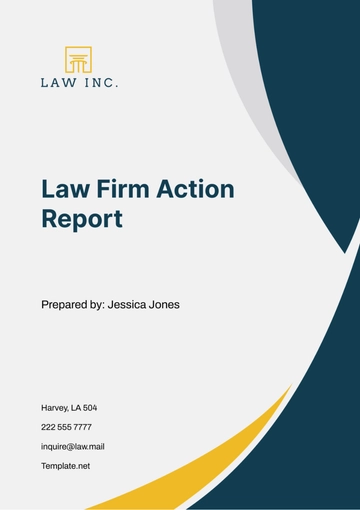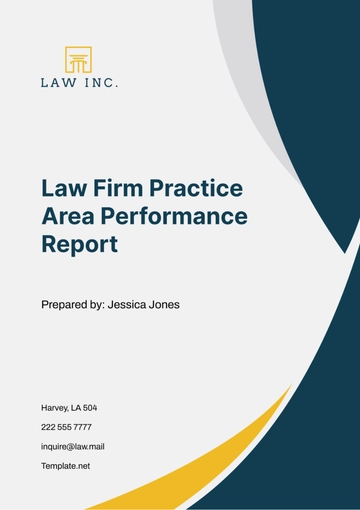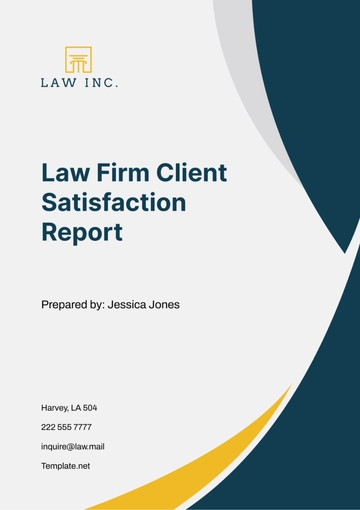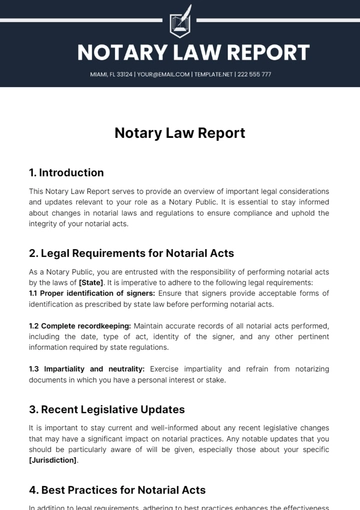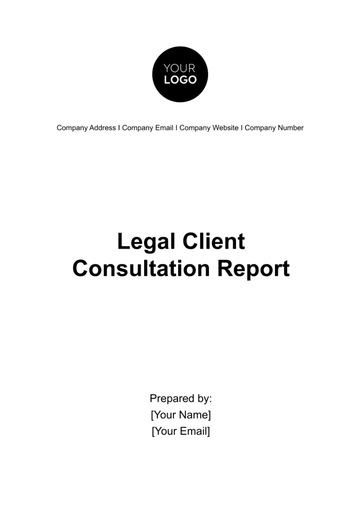Free Law Firm Trial Preparation Report
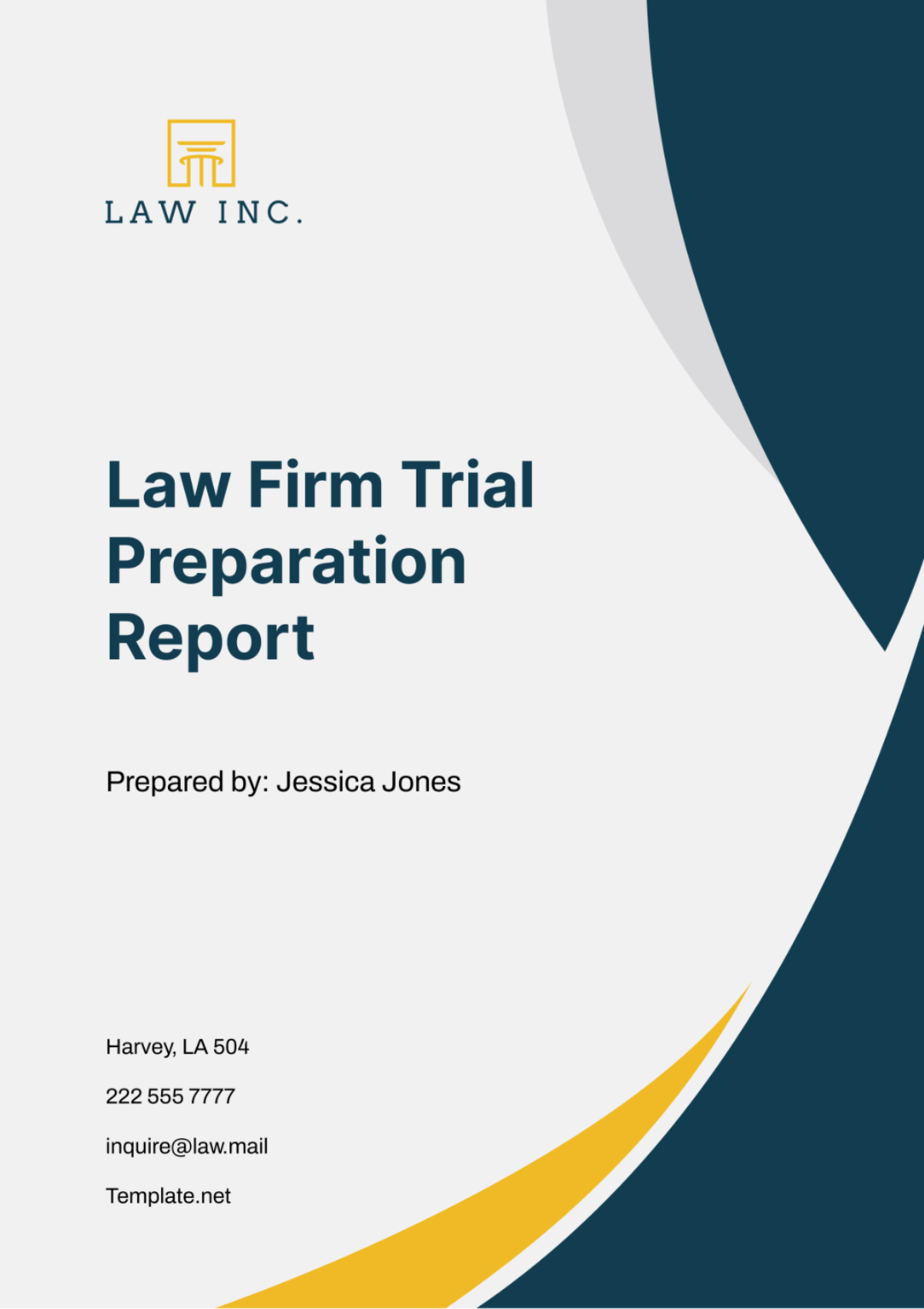
I. Executive Summary
A. Overview
Purpose of the Report
This trial preparation report aims to provide a comprehensive analysis and strategic plan for the upcoming legal proceedings in the case of [Case Name]. It outlines key findings, recommendations, and strategies to ensure effective trial preparation.
Summary of Findings
Through thorough examination of evidence, legal precedents, and case analysis, several critical factors have been identified that will significantly impact the outcome of the trial. These findings are summarized to guide the development of a robust trial strategy.
B. Key Recommendations
Strategy for Trial Preparation
Our primary recommendation is to focus on building a strong narrative that highlights our client's innocence and counters any allegations made by the opposing party. We will achieve this by:
Key Strategy: Emphasizing our client's adherence to contractual obligations and the absence of negligence or wrongdoing.
Specific Tactics: Presenting compelling evidence, including contract documents, witness testimonies, and expert opinions, to support our arguments. We will also strategically cross-examine opposing witnesses to undermine their credibility and weaken their case.
Additional Recommendations: Engaging in settlement negotiations to explore opportunities for resolving the dispute amicably while remaining prepared to proceed to trial if necessary.
Key Areas of Focus
Key areas requiring particular attention include:
Contractual Obligations: Ensuring clarity regarding the terms and conditions of the contract and demonstrating our client's compliance with their obligations.
Evidence Presentation: Organizing and presenting evidence in a clear and persuasive manner to strengthen our arguments and refute any allegations of wrongdoing.
Witness Credibility: Thoroughly preparing our witnesses to testify effectively and withstand cross-examination, thereby enhancing their credibility and the credibility of our case.
Legal Precedents: Conducting comprehensive research on relevant legal precedents and case law to support our legal arguments and anticipate potential challenges from the opposing party.
Trial Strategy: Developing a cohesive trial strategy that aligns with our objectives and adapts to the evolving dynamics of the case during trial proceedings.
C. Conclusion
This report serves as a roadmap for effective trial preparation, emphasizing the importance of a well-executed strategy and comprehensive approach to addressing key issues. By following the recommendations outlined herein, we aim to position ourselves for success in the upcoming legal proceedings.
II. Introduction
A. Background Information
[Your Company Name]'s Involvement
[Your Company Name], a leading law firm specializing in [Legal Practice Area], has been retained to represent [Client Name] in the case of [Case Name]. With [Number] years of experience and a track record of successful litigation outcomes, our firm is well-equipped to handle the complexities of this case.
Case Overview
The case of [Case Name] revolves around a breach of contract dispute between two parties involved in a business transaction. [Plaintiff Name], the plaintiff, entered into a contractual agreement with [Defendant Name], the defendant, for the purchase and delivery of a specialized machinery component critical to [Client Name]'s manufacturing operations. However, [Defendant Name] failed to deliver the agreed-upon goods within the specified timeframe, leading to disruptions in [Client Name]'s production process and financial losses.
The nature of the dispute primarily concerns the breach of contract by the defendant and the resulting damages incurred by [Client Name]. [Plaintiff Name] alleges that [Defendant Name]'s failure to deliver the machinery component as promised constitutes a breach of their contractual agreement, entitling him to remedies for the losses suffered. On the other hand, [Defendant Name] disputes the allegations of breach and contends that unforeseen circumstances beyond her control prevented timely delivery, absolving her of any liability.
Conflicting claims regarding the performance and fulfillment of contractual obligations form the crux of the legal dispute between the parties. [Client Name] seeks compensation for financial losses, damages for business disruptions, and legal costs incurred as a result of the defendant's alleged breach of contract. Conversely, the defendant asserts defenses against [Client Name]'s claims, including arguments of force majeure, mitigating circumstances, and lack of causation.
B. Objectives
Purpose of Trial Preparation
The primary objective of trial preparation is to ensure that our legal team is fully equipped to present a compelling case in court and effectively advocate for our client's interests. This involves conducting thorough research, preparing evidence, and developing a strategic plan to address potential challenges.
Goals of the Report
The goals of this report are to:
Provide a comprehensive analysis of the case and key legal issues.
Offer strategic recommendations for trial preparation based on the findings.
Outline a detailed plan of action to guide our efforts leading up to the trial date.
Ensure alignment and clarity among all stakeholders involved in the litigation process.
III. Case Analysis
A. Legal Issues
Summary of Legal Points
The case of [Case Name] involves several intricate legal issues pivotal to our strategy:
Legal Issue | Description |
|---|---|
Breach of Contract | Plaintiff alleges that the defendant breached the contract by failing to deliver the agreed-upon goods on time. |
Negligence | Defendant claims that plaintiff's injuries resulted from their own negligence rather than any fault of the defendant. |
Product Liability | Plaintiff argues that a defective product supplied by the defendant caused their injuries, holding them liable. |
Analysis of Precedent Cases
An analysis of relevant precedent cases reveals insights into similar legal issues. By studying past judgments, we can anticipate potential outcomes and tailor our arguments accordingly.
IV. Trial Strategy
A. Theme Development
Key Messages
Our theme for the trial will revolve around "Justice Prevails", emphasizing the importance of accountability to resonate with the jury and strengthen our position.
Jury Appeal
We will craft our arguments with the aim of capturing the jury's attention and persuading them to favor our client. Strategies for enhancing jury appeal include emphasizing the human impact of the case and building emotional connections with the jurors.
B. Case Presentation
Order of Witnesses
The sequence of witnesses will be strategically arranged to build a compelling narrative and reinforce key aspects of our case. Key witnesses include [Witness Name 1], [Witness Name 2], and [Witness Name 3], each with a crucial role in supporting our arguments.
Use of Exhibits
We will utilize a variety of exhibits, including documents, visual aids, and expert reports, to substantiate our claims and provide compelling evidence to the jury. These exhibits will include contracts, photographs of the defective product, and expert testimony.
C. Risk Assessment
Strengths and Weaknesses
An assessment of our case reveals both strengths and weaknesses. While we have strong evidence supporting our claims of breach of contract and product liability, we must also address potential vulnerabilities such as challenges to witness credibility and counterarguments related to negligence.
Mitigation Strategies
To mitigate risks, we will implement strategic measures such as conducting thorough witness preparation sessions, anticipating and addressing potential objections, and presenting alternative interpretations of the evidence, ensuring that we are well-prepared to counter any challenges presented during the trial.
VII. Budget and Cost Analysis
A. Cost Estimates
Legal Fees
Service
Cost Estimate
Lead Attorney
[$10,000]
Associate Attorney
[$7,500]
Paralegal Services
[$3,000]
Court Filings and Fees
[$2,000]
Expert Witness Fees
[$15,000]
Expert Witness Costs
Expert Witness
Cost Estimate
Medical Expert
[$8,000]
Engineering Expert
[$10,000]
Economic Expert
[$12,000]
Other Specialists
[$5,000]
B. Budget Allocation
Contingency Planning
Expense Category
Budget Allocation
Contingency Fund
[$20,000]
Unexpected Expenses
[$5,000]
Additional Legal Resources
[$10,000]
Expense Tracking
Expenses will be tracked meticulously using [Your Company Name]'s accounting system, with regular updates provided to the client to ensure transparency and accountability.
VIII. Risk Management
A. Contingency Plans
Alternative Strategies
In the event of unforeseen circumstances or unexpected developments during the trial, [Your Company Name] will have contingency plans in place to adapt our legal strategy. This may involve exploring settlement options, adjusting witness testimonies, or pursuing alternative legal arguments to mitigate risks.
Crisis Response Protocol
[Your Company Name] has developed a comprehensive crisis response protocol to address any emergencies or disruptions that may arise during the trial. This protocol includes designated points of contact, escalation procedures, and predefined strategies for managing crisis situations effectively.
B. Communication Plan
Internal Updates
Regular internal updates will be provided to the legal team, ensuring that all members are informed of case developments, strategy adjustments, and any emerging risks or challenges. This communication ensures alignment and enables swift decision-making.
Client Reporting
[Your Company Name] is committed to maintaining open and transparent communication with our client throughout the trial process. We will provide regular reports detailing case progress, budget updates, and risk assessments, allowing the client to remain fully informed and engaged in the litigation strategy.
IX. Conclusion
A. Summary of Key Points
This trial preparation report has provided a thorough analysis of the case of [Case Name], outlining key legal issues, strategic recommendations, and a comprehensive plan for trial preparation. By addressing critical areas of focus and implementing risk management strategies, we aim to position ourselves for success in the upcoming legal proceedings.
B. Next Steps
Implementation Plan
The next steps in our trial preparation process include:
Finalizing witness preparation sessions.
Completing the organization of trial exhibits and documentation.
Conducting mock trial simulations to refine our case presentation strategy.
Reviewing and finalizing contingency plans to address potential risks.
Follow-Up Actions
Following the trial preparation phase, [Your Company Name] will continue to support our client throughout the trial proceedings, providing ongoing legal counsel, representation, and advocacy. We remain committed to achieving the best possible outcome for our client and will adapt our strategies as needed to navigate the complexities of the legal process.
- 100% Customizable, free editor
- Access 1 Million+ Templates, photo’s & graphics
- Download or share as a template
- Click and replace photos, graphics, text, backgrounds
- Resize, crop, AI write & more
- Access advanced editor
Prepare for trials efficiently with Template.net's Law Firm Trial Preparation Report Template. This editable and customizable document streamlines the preparation process, ensuring thoroughness and professionalism. Crafted by legal experts, it aligns with industry standards and best practices. Editable in our Ai Editor Tool for seamless customization and integration into your firm's trial management system.
You may also like
- Sales Report
- Daily Report
- Project Report
- Business Report
- Weekly Report
- Incident Report
- Annual Report
- Report Layout
- Report Design
- Progress Report
- Marketing Report
- Company Report
- Monthly Report
- Audit Report
- Status Report
- School Report
- Reports Hr
- Management Report
- Project Status Report
- Handover Report
- Health And Safety Report
- Restaurant Report
- Construction Report
- Research Report
- Evaluation Report
- Investigation Report
- Employee Report
- Advertising Report
- Weekly Status Report
- Project Management Report
- Finance Report
- Service Report
- Technical Report
- Meeting Report
- Quarterly Report
- Inspection Report
- Medical Report
- Test Report
- Summary Report
- Inventory Report
- Valuation Report
- Operations Report
- Payroll Report
- Training Report
- Job Report
- Case Report
- Performance Report
- Board Report
- Internal Audit Report
- Student Report
- Monthly Management Report
- Small Business Report
- Accident Report
- Call Center Report
- Activity Report
- IT and Software Report
- Internship Report
- Visit Report
- Product Report
- Book Report
- Property Report
- Recruitment Report
- University Report
- Event Report
- SEO Report
- Conference Report
- Narrative Report
- Nursing Home Report
- Preschool Report
- Call Report
- Customer Report
- Employee Incident Report
- Accomplishment Report
- Social Media Report
- Work From Home Report
- Security Report
- Damage Report
- Quality Report
- Internal Report
- Nurse Report
- Real Estate Report
- Hotel Report
- Equipment Report
- Credit Report
- Field Report
- Non Profit Report
- Maintenance Report
- News Report
- Survey Report
- Executive Report
- Law Firm Report
- Advertising Agency Report
- Interior Design Report
- Travel Agency Report
- Stock Report
- Salon Report
- Bug Report
- Workplace Report
- Action Report
- Investor Report
- Cleaning Services Report
- Consulting Report
- Freelancer Report
- Site Visit Report
- Trip Report
- Classroom Observation Report
- Vehicle Report
- Final Report
- Software Report
